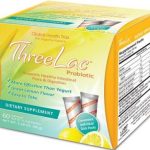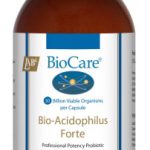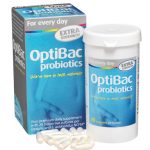Don’t be deceived, not all bacteria’s the same; not all bacteria’s bad. Yes, bacteria gets a bad rap, but that’s the ‘bad’ bacteria, which definitely isn’t healthy when it’s consumed via food or fluids and gets into your digestive and other systems. The other kind of bacteria is the ‘good’ type, which is just the opposite – it possesses much sought-after health-giving properties; one of which is to balance out the amount of ‘bad’ bacteria in your intestines (and hopefully tip the balance in its favour).
One of the most commonly consumed forms of good bacteria is probiotics. A select number of live bacteria and yeast groups that have unquestioned health benefits, probiotics are especially prevalent in the digestive system – specifically the intestines (which is why, like their bad bacteria counterparts there, they’re referred to as ‘gut bacteria’). It’s here then where they’re healthy-do-gooding proves critical to the overall body and the wellbeing of its owner, given the fact that so many of our common-day chronic ailments actually kick-off in this part of the body. How they do is this is by stimulating the natural enzymes and processes in the gut to ensure the digestive organs keep working well; and in turn, nullifying the harmful effects of bad gut bacteria.
Probiotic Foods
So how exactly can you top up the health-enhancing live bacteria residing in your gut? Well, the ideal way is to pepper your diet with organic, probiotic-rich foods:
- Kefir – a fermented dairy product that features goat’s milk, along with kefir grains; it also offers Lactobacilli and bifidus bacteria, as well as terrifically health-enhancing antioxidants1
- Kimchi – you may never have heard of it, but the experts maintain that this Asian-cuisine pickled sauerkraut is one of the best sources for probiotics; offering a delicious spicy smack of a taste, it contains lashings of good bacteria, Vitamins B and C, beta-carotene, calcium, fibre, iron and potassium2
- Live-cultured yoghurt – often this kind of yoghurt made with nutrient- and protein-rich goat’s milk (especially if it’s infused with additional probiotics such as lactobacillus and acidophilus) is great for gut bacteria, not least as goat’s milk possesses lower allergenicity and tends to be easier to digest than cow’s milk3; try to avoid yoghurts that count additives among their ingredients, though
- Miso soup – a favourite of Japanese cuisine, this tasty concoction is derived from rice/ barley, beans and fermented rye; merely add a tablespoon of the stuff to hot water and you’ve a quick soup packed with bifidus bacteria and lactobacilli
- Pickled vegetables – a mainstay in Western food for centuries, the humbled pickled cucumber or onion (or practically any pickled vegetable, for that matter) offers a roster of probiotic potential5; they may take some time to prepare and be ready to eat, but if you like the taste they’re well worth the effort
- Sauerkraut – a German dish made from fermented cabbage, sauerkraut may not sound the most appetising, but initial impressions can be deceptive when it comes to foods and how they taste; it’s also resplendent in live cultures and Vitamins A, B, C and K
- Tempeh – great for vegetarians (for whom it can be a meat- of tofu-substitute), this fermented grain is derived from soybeans7 and contains lots of Vitamin B128; sauté, bake or add this low-salt foodstuff to salads.
Probiotic Supplements
Now, fair dos, should your palate be rather ‘Western’ when it comes to cuisine, then two or three of the probiotic-rich options above may not leave you salivating. How else to boost the good bacteria levels in your gut then? Well, there’s supplementation, of course – and, as ever, natural is the way to go here over synthetic supplements. The following – among many more (check the ‘Probiotics’ section on our website) – are all available via The Finchley Clinic:
 Threelac– comprises three separate forms of spore-forming lactic acid bacteria (Lactobacillus sporogenes, Bacillus subtilis and Streptococcus faecalis) to purge the intestinal tract of the parasitic Candida yeast and push out harmful dysbiotic microorganisms; similar to its sister product Fivelac.
Threelac– comprises three separate forms of spore-forming lactic acid bacteria (Lactobacillus sporogenes, Bacillus subtilis and Streptococcus faecalis) to purge the intestinal tract of the parasitic Candida yeast and push out harmful dysbiotic microorganisms; similar to its sister product Fivelac.
 Bio-Acidophilus Forte Plus – a high-strength probiotic product that contains 75 billion viable organisms per capsule, including acidophilus and bifidum in a base of fructo-oligosaccharides.
Bio-Acidophilus Forte Plus – a high-strength probiotic product that contains 75 billion viable organisms per capsule, including acidophilus and bifidum in a base of fructo-oligosaccharides.
 Optibac Probiotics For Every Day Extra Strength – offers 20 billion live micro-organisms per capsule, with five probiotic strains, including Lactobacillus acidophilus NCFM; may well aid your digestion and immunity and boost your energy.
Optibac Probiotics For Every Day Extra Strength – offers 20 billion live micro-organisms per capsule, with five probiotic strains, including Lactobacillus acidophilus NCFM; may well aid your digestion and immunity and boost your energy.
References:
1. Prado M. R. et al. ‘Milk Kefir: Composition, Microbial Cultures, Biological Activities, and Related Products’. Frontiers in Microbiology. 6: 1177. PMC. 30 Oct 2015.
2. Peacock J. ‘Kimchi, the Korean Superfood’. Eat Smart Move More. Virginia Polytechnic Institute and State University. 9 May 2014.
3. Damunupola D. A. P. R. et al. ‘Evaluation of Quality Characteristics of Goat Milk Yogurt Incorporated with Beetroot Juice’. International Journal of Scientific and Research Publications. vol. 4, no. 10. Oct. 2014.
34. Fujisawa T. et al. ‘Effect of Miso Soup Containing Natto on the Composition and Metabolic Activity of the Human Faecal Flora’. Microbial Ecology in Health & Disease, vol. 18, no. 2. 1 June 2006.
